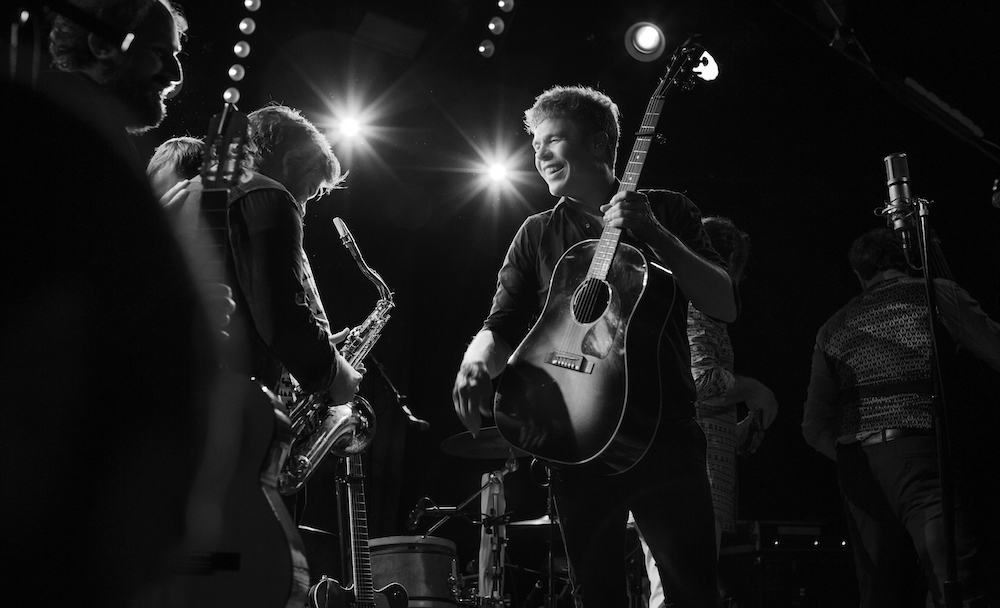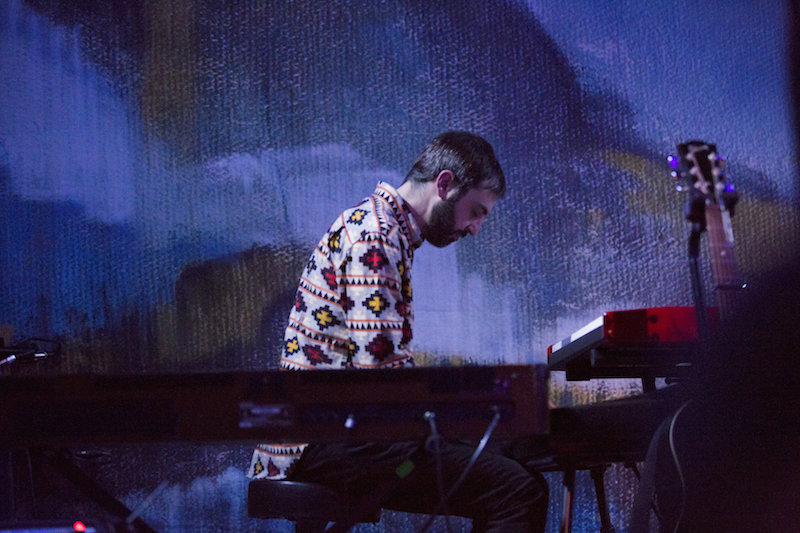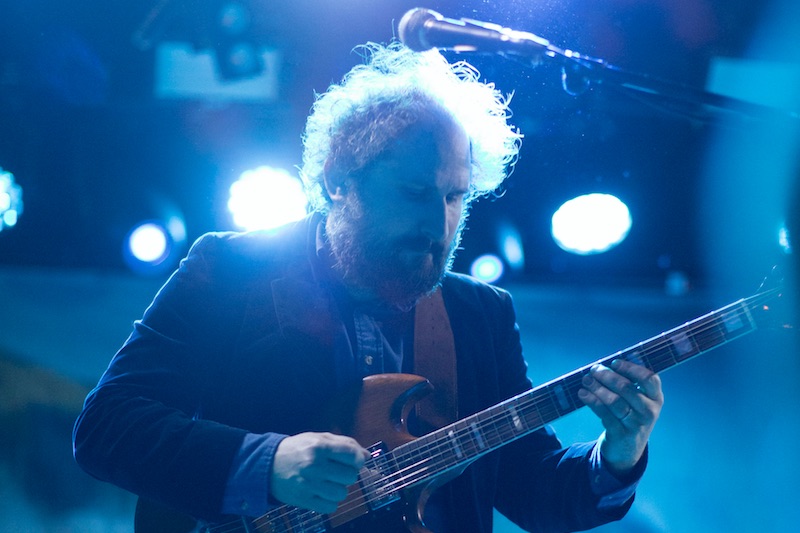
Photos by Nicola Buck
—
Idaho-born Josh Ritter has found amazing success in the 18 years since Glen Hansard chanced upon him at a Boston open mic and invited him on tour, opening for his band The Frames back in Ireland. His brand of Americana is a winning combination of fluttery fingerpicking, Dylanesque style vocals and narrative songs in the tradition of Leonard Cohen, complex in biblical imagery with a modern twist of wry humor. For his ninth album, 2017’s Gathering, Ritter realized he wanted the musicians who play and have supported him as The Royal City Band for more than a decade to have opportunities to take the lead and see what musical paths they might go down.
The result is a change in tempo and a record that continues to build on the electric rock leanings of his critically acclaimed fifth album The Historical Conquests of Josh Ritter, but also strides confidently into blues and gospel. On “Showboat,” one of the album’s highlights, Ritter even appears to be channelling a Neil Diamond swagger, with a change-up in the timbre of his vocals.
It was at the end of his last album that he felt a longing for the company of this band of musicians: Zach Hickman, Sam Kassirer, Josh Kaufman and Ray Rizzo. So enamored of what they bring to the table, he admits sometimes he just stops to listen to them mid-song. “I‘m just so in love with what they’re doing that I forget what I’m suppose to do,” he says proudly, over a phone call in Los Angeles.
Ritter has consistently put out critically acclaimed records, from the politically charged The Animal Years, to the heartbreak-wrought Beast in Its Tracks, and more recently the textured Sermon on the Rocks. He’s also written a novel, 2011’s Bright’s Passage, and painted the cover art for Gathering. Showing no signs of slowing down, Ritter puts his triumphs down to his desire to keep changing.
Currently in the midst of an extensive U.S. tour, we got a chance to speak after his L.A. show at the Teragram Ballroom. He discussed his beloved band, the times we live in, and making art—from songwriting to novels and painting—as an elixir to happiness.
Caught your show last night – you singing “The Temptation of Adam” about love “in a silo with the threat of WWIII” had a whole different edge, with all this White House Twitter talk of whose nuclear button is bigger.
Yes, totally. It is so strange when a song gets another meaning, or a more consistent meaning. I find that so interesting.
We live in strange times.
Yes, it’s not as funny as it once was.
There was also such amazing chemistry with your band. How big a role did they play in your most recent album Gathering?
When I made Sermon on the Rocks, I knew what I wanted; I probably held onto the reins pretty tightly. With Gathering, I realized I have this amazing group of musicians around me and the songs can only benefit from their unique viewpoints. We’ve been playing together for so long that they have a real sense of what I might be going for and I have an idea when I am writing the songs, of what they can do. So it feels like we’ve got this really beautiful balance. All that’s required is that I keep an open mind and that was the main thrust of Gathering—to really stay open about the production and where the songs could go. It was really fun.
What’s it like reaching a milestone like 20 years of making music? Did it force serious introspection, newfound inspiration, a move to make this change?
It’s so important to be shifting and changing in the very basics of life; it’s so easy to become bored and sedentary. And artistically, to be searching for new avenues. At a certain point that is the name of the game. When you first get started the whole world is something brand new to be written about. As time goes by, your voice has to change with who you are. You want to make sure that your transformation continues; new music, new book ideas, try not to be the exact same person you were the record before. I don’t want to be a medley artist. I want to stay new.
The only constant is change.
Exactly. Also, there’s always that bit of dissatisfaction and that keeps you alive, and creating.
I loved “Showboat.” It moves away from that folk-pop-troubadour playbook that I associate most with your music – it has a Neil Diamond swagger to it. What inspired it?
I was watching one of those commercials on TV; a guy talking about pouring something on your car and it wipes away all the dirt and scratches. And along that line of “here’s a helpful tip,” I was thinking, what about let’s wait for rain to come before you start to cry? That way they’ll never see you cry. And that set me off down the road to write about this pressure to never show your true emotions; as you’re trying to be with someone new, or get over someone. I think a lot of the characters on the record are big talking, there’s a lot of bluster but beneath it there’s a fragility. That was something that first came about on “Showboat” and I kinda really liked that character, so I wrote it into the rest of the record. I chose material based on that and it was one of the ways that the record’s held together.
And was this also an example of allowing the other musicians to take it somewhere melodically that you wouldn’t have otherwise gone?
Yeah. When I wrote the song I had a rhythm in my head, far more a steady train-track beat, a shuffle. The moment I played it to the guys, it changed and immediately had a slinky-ness to it. They took it an added an amazing rhythm that I couldn’t have gotten myself, but it became so clear and obvious once they played it, that it was how the song should go. So I switched it up, I lowered the tempo and changed the way I was singing it. Sometimes you just kinda catch that, and it works; that unexpected path you take really is a new way of seeing something.
That accounts for the range of musical styles in Gathering. We know now that the album has really struck a chord with critics and fans, but at any point there, were you nervous about branching out into these other styles on the one album?
I’ve always felt that you’ve got to write about what you’re going to write; you can’t expect it to all just hang together naturally. I find for me, I just have to write everything then see where the intersections are. I don’t like to make concept records; to write songs to a set plan. For me, it’s always been, you write to give yourself a feeling, and if it succeeds then I know it’s useful and interesting for the record I’m making. When I took a step back and looked at the 30 or more songs that we’d recorded for Gathering the ones that needed to be together were clear.


Are they any songs that are begging to be grown into a bigger story, like your novel Bright’s Passage?
I think of songs as hallways; we each go through our own hallway when we’re listening, and we each go through our own doors into our own worlds, songs take us into our own heads in really fundamental ways. Behind one of those doors, to one of these songs that I was working on was this whole story. I didn’t know what to do, I thought I could write a longer song but I wasn’t quite sure that I could pull it off. Then I thought, “Here’s a chance to work on something that I’ve always wanted to do; expand the idea into this larger world, the world of a novel.” It was such an adventure and I really want to do it again. I have rough drafts, but it’s just a matter of finding the time and space to go a little bit of crazy.
You have an intermittent blog "Book of Jubilations" and once wrote a post about needing a desk in order to write a novel. It’s interesting how we put these things outside of ourselves as stumbling blocks to overcome, rather than the internal harder struggle of just writing. You’ve written a novel, and lots of albums. What is it, self doubt, procrastination or a search for answers greater than ourselves?
I think the really scary thing is in order to work on something, you don’t need anything at all. We have all we need to make something. People write novels on their phones now. It’s an amazing time, there are no physical stumbling blocks to creating work and sharing it with the world as fast as you want. Record labels, publishing, you don’t even need that anymore. And in it’s own way, as an artist, that can be a terrifying thing; you’re at the edge, all you have to do is jump! The rest of it is, do I have a desk, paper? It doesn’t matter. If you really have something to say, just take the leap, then persevere.
When you released The Animal Years, you had said it was “a time of great confusion in American identity,” with the Iraq war, the Bush era, post-9/11. You had to re-define your relationship to your homeland. Once again, it’s that time of reckoning.
Yeah.
I feel like “Miles Away” speaks to the current climate. I know it’s a standalone single, but could that give us hint into perhaps the direction of your 10th album?
“Miles Away” just came to me. I had it in my head, so I worked on it then recorded it. It was a time between albums and I didn’t know what direction the new album would take, but I didn’t want to lose track of it. Then the record took me in a completely different direction. I have that increasingly with songs; creating without an editor, I end up with stuff that I don’t exactly know what to do. These days it feels crucial to keep putting music out there. Makes me feel more stable in these really strange times. Whatever the job of singing songs and making music is, I’ve never felt the need to be incredibly explicit about the time period I’m writing about. If I’m honest, it should capture that, in the ember, you know? It just felt like the right time to put it out; it matched the moment. Gathering, too, feels like a re-evaluation of America at this moment; the feelings I get when I think about it.
When we hear Americana music, for the most part we might think of Tennessee or somewhere in the South, or Midwest. Of course, these days, increasingly genre labels have gone by the wayside. Nonetheless, you live in Brooklyn; we think hipsters, moody electronic-duos recording in their basement. How has where you currently live affected your well-worn influences of a youth in Idaho, apart from the fact that you have a Made in Brooklyn “Gathering” Fragrance being sold on your website?
(Laughs) That’s a great question. One of the reasons I had moved to Brooklyn was I needed the energy—so many musicians here, everybody’s hustling. And that hustle is so inspiring. Every member in my band is also working on other projects. And I have other friends I see touring, doing different things. The cross-pollination is something else. It’s nice to look around and see people working hard. The creative process is less lonely, other musicians are having the same issues. It’s a wonderful place to be in and it’s expanded my life’s experiences; to be able to just walk down a street and have an adventure. Like, I can walk along, take a boat across the East River and go to the Met. Or I can walk across the bridge and go down a side street to a little neighborhood, full of color and excitement. It’s so great to raise a kid in the midst of all that. To see life through somebody’s eyes for that first time, it’s really good for me as an artist. ■
Josh Ritter & the Royal City Band’s upcoming tour schedule:
Jan. 23—Sisters, OR—Sisters High School
Jan. 24—Portland, OR—Crystal Ballroom
Jan. 25—Seattle, WA—Neptune
Jan. 26—Spokane, WA—Knitting Factory
Jan. 27—Boise, ID—Knitting Factory
Jan. 29—Denver, CO—Ogden
Jan. 30—Lawrence, KS—Liberty Hall
Jan. 31—Minneapolis, MN—Fitzgerald Theater
Feb. 16—Nashville, TN—Ryman Auditorium
Feb. 17—Louisville, KY—KCD Theatre
Feb. 18—Louisville, KY—KCD Theatre
Feb. 20—Vancouver, BC—Commodore Ballroom
Feb. 21—Nelson, BC—Spiritbar
Feb. 22—Banff, AB—Eric Harvie Theatre
Feb. 23—St. Albert, AB—Arden Theatre
Feb. 24—St. Albert, AB—Arden Theatre
Feb. 26—Saskatoon, SK—Broadway Theatre
Feb. 27—Swift Current, SK—Lyric Theatre
Feb. 28—Winnipeg, MB—Park Theatre
Mar. 1—Fargo, ND—Fargo Theatre
Mar. 2—Omaha, NE—Slowdown













Comments